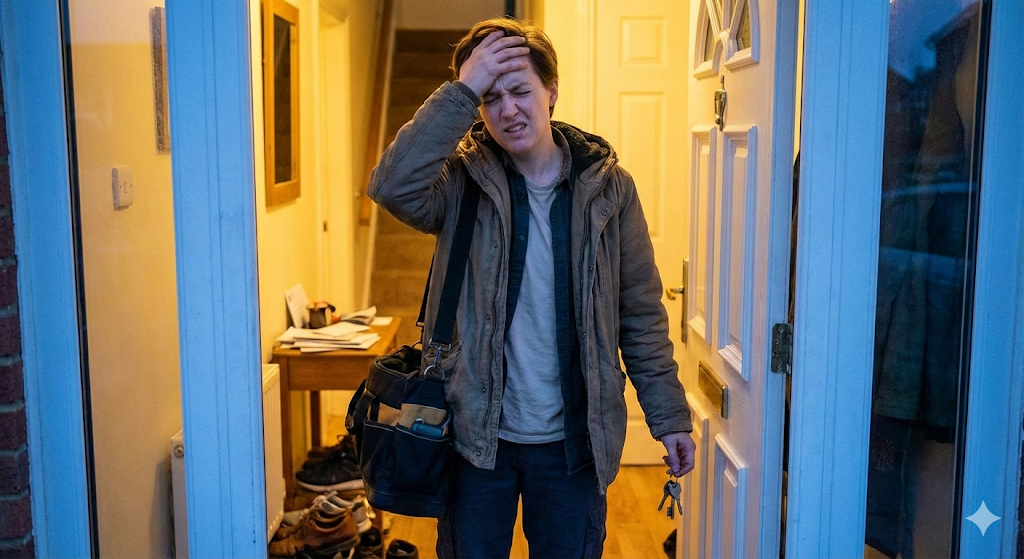You know the feeling. You turn the key, push open the front door, and instead of relief, you are hit with a wave of irritation.
It should be the best moment of the day. You have finished your commute, the workday is behind you, and you are finally in your sanctuary. Yet, the moment you cross the threshold, your mind goes blank, or worse, it floods with annoyance. You see the shoes in the hallway, you forget what you were going to do for dinner, and you snap at your partner or kids before you’ve even taken off your coat.
This isn’t just you being grumpy. It is a psychological phenomenon known as the Doorway Effect, colliding with the emotional baggage of your day.
Understanding the Science: The Event Boundary
Psychologists at the University of Notre Dame have studied this phenomenon extensively. They found that passing through a doorway creates an “event boundary” in the brain. Your mind compartmentalizes memories and tasks based on physical rooms. When you move from one environment (the outside world/work) to another (home), your brain performs a “hard reset” to clear space for new information.
While this helps your brain stay organized, it causes emotional friction when you are carrying stress. You walk in expecting to relax, but your brain dumps your short-term memory (the plan for the evening) while your body holds onto the cortisol (the stress from the day). The result? Confusion mixed with high arousal. You feel frustrated because your mental gears are grinding against a sudden context switch.
How to Decompress Using the LOWER Method
To handle this specific transition without spiraling into evening-ruining irritation, we can apply the LOWER Method. This 5-step framework helps process emotional spikes effectively.
L – Label
The first step is to stop the autopilot reaction. Instead of lashing out or stewing in silence, identify the situation clearly.
Say this to yourself:
“That’s frustrating when I walk through the door expecting peace but immediately feel overwhelmed by a mental reset and household chaos.”
By engaging the language centers of your brain, you dampen the amygdala’s “fight or flight” response. You are acknowledging that the transition itself is the trigger, not necessarily your family or your messy hallway.
O – Own
Frustration often feels like something happening to us. To regain control, you must shift the perspective to your internal experience. This prevents you from projecting your bad mood onto others.
Shift your language:
“I feel frustrated when my brain switches contexts so abruptly that I lose my train of thought and feel unmoored.”
This subtle shift is crucial. If you have had a difficult day dealing with a passive-aggressive coworker, you might be carrying that defensiveness home. Owning the feeling helps you distinguish between “I am mad at my spouse” and “I am still vibrating from the meeting I had at 4:00 PM.”
W – Wait
The “Doorway Effect” happens in a split second. The antidote is to slow down time.
Do not rush to put down your keys. Do not rush to answer the question your child is asking. Just wait.
Stand in the entryway (or even just outside the door) for 10 to 30 seconds. Allow your brain to catch up to your body. This pause acts as a bridge over the event boundary, preventing the “hard reset” from feeling like a crash.
E – Explore
Now that you have paused, you can look for constructive ways to bridge the gap between “Work You” and “Home You.” Here are four suggestions to navigate the Doorway Effect:
1. The Vestibule Ritual: Create a specific action that signals the end of the work chapter. This could be hanging your keys on a specific hook or taking off your watch. As you do it, consciously visualize the “work file” in your brain closing.
2. Vocalize Your Intention: Because the Doorway Effect erases short-term memory, say your immediate plan out loud before you cross the threshold. “I am going inside to kiss my wife and change my pants.” This encodes the memory verbally, making it harder to lose during the context switch.
3. Sensory Grounding: If you feel the frustration rising, grab a cold glass of water or wash your hands immediately. The temperature change forces your brain to focus on the present physical sensation rather than the lingering stress of the commute.
4. The “Ten-Minute Buffer”: Negotiate a rule with your household. When you walk in, you get 10 minutes of silence to decompress. This is especially helpful if you have teenagers; diving straight into complex topics can lead to conflict. (For more on this, see this guide on talking to teens without them shutting down).
R – Resolve
Finally, move forward with a clear head. You have acknowledged the science of the doorway and the emotion of the frustration.
You can now enter your home fully. The frustration might not be gone 100%, but it is no longer driving the bus. You have resolved to leave the “event boundary” behind you and be present in your sanctuary.
FAQs About the Doorway Effect
Q: Is the Doorway Effect a sign of memory loss?
A: No. It is actually a sign that your brain is working correctly! Research shows that the brain efficiently separates memories to keep them organized. It’s a feature, not a bug.
Q: Does this only happen at home?
A: It happens everywhere—moving from a meeting room to an office, or the living room to the kitchen. However, the emotional frustration is usually highest when arriving home because the stakes (relaxation) are higher.
Q: Can looking at my phone worsen the effect?
A: Yes. If you are checking emails while walking in, you are splitting your attention. When the “event boundary” hits, your brain drops the email context and the home context, leaving you doubly confused and irritable.
Closing Thoughts
The threshold of your home should be a line of safety, not a trigger for stress. The next time you turn that key and feel the familiar prickle of irritation, remember: it’s just the Doorway Effect. Your brain is clearing the decks. Use the LOWER method to make sure it clears the stress, too, leaving you free to enjoy your evening.
For more insights on the science of forgetting and event boundaries, you can read the full study from the University of Notre Dame.





Leave a Reply